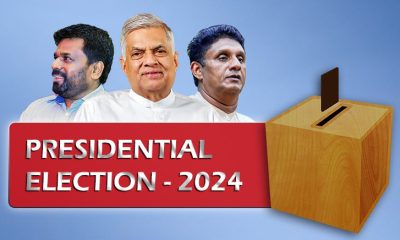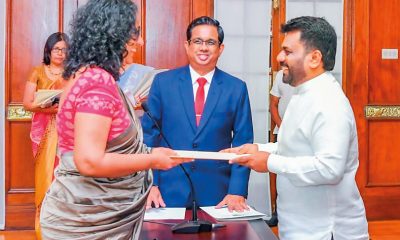Opinion
Short reply to President Ranil’s public address
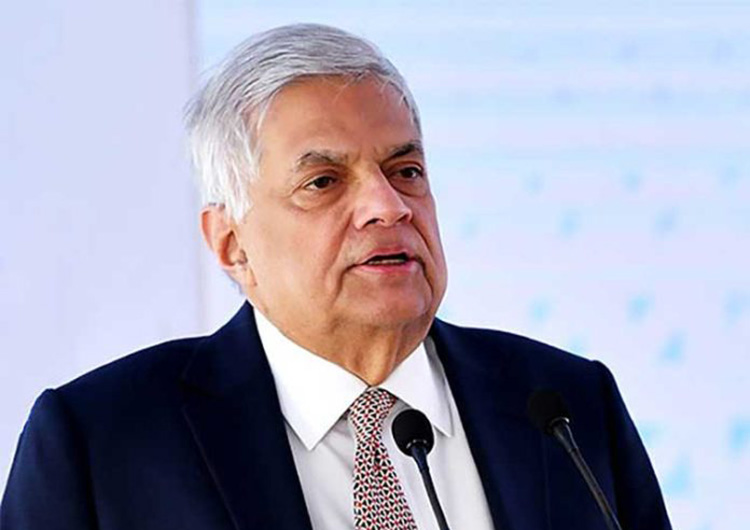
President used the TV channels to make a public address to the nation. The other two contenders for Presidency Sajith and Anura may agree with some of the statements or disagree with some or disagree with the whole statement President made. Whatever said and done in a true democracy all must have an equal platform for their campaigns. The whole world witnessed the two contenders debating in supports of their campaigns for the US Presidency.
I suggest that Ranil, Sajith and Anura debate the past, current and future issues on live TV with a suitable moderator to conduct the debate. Each to come alone for the debate or with two others from their group. If this can happen that will be a good opening for the voters to decide who their leader must be and also expose Sri Lanka as a vibrant Democracy.
Hemal Perera
Opinion
Just the first step …
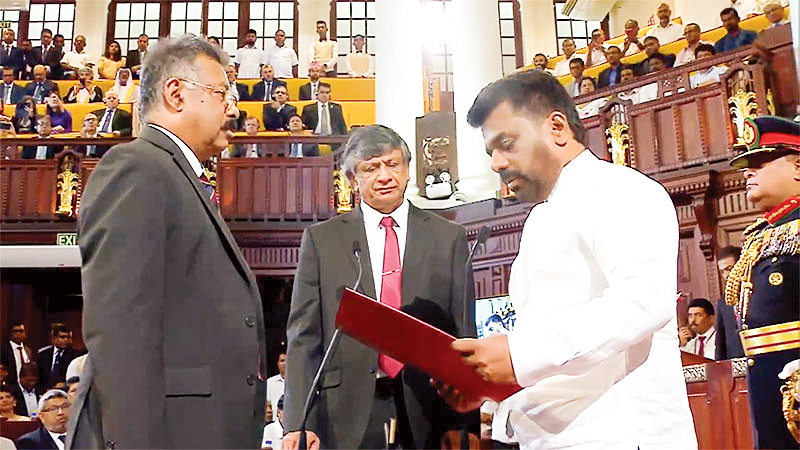
by Geewananda Gunawardana
The last election was a momentous landmark in Sri Lanka’s history. It is an important first step in the right direction. Political analysts and historians will dissect the results for years to come. The two-toned map that was flashed all over media, raises major questions that are relevant in taking the next step: what is the reason for such a marked difference in opinions about the direction the country should take? Are the voters well informed?
What is the extent of the participation in the democratic process? We may not have definitive answers until the academics start authoring their theses in years to come. This essay suggests that our collective experience over millennia that shaped our culture also plays a key role in shaping our political psyche. The proposition is that our entrenched reverence of the elite, forces us to overlook their dark side and leave our future in their hands.
Monarchs ruled us for millennia, and it ended with the Kandyan Nayak Dynasty. Then the European colonizers ruled us for 450 years. After independence, it was the elite that ruled the country. Pluralist democracy is a relatively new concept to us. The centuries old subservience to monarchy is engraved in our psyche so deeply that it has become a national trait to submit ourselves to the whims of the elite unconditionally. For example, having a certain family name is enough to address one with absurd honorifics when they have no redeeming qualities of their own.
The role of equally absurd caste system in politics and the Buddhist monastic order is another. The last election will go down in history as the first step, albeit a small one, towards wiping out the scourge of reverence to elitism from the face of this country. However, most of us fail to untangle the complex web tying elitism, corruption, and the all-important economy together.
If the dictionary defines elite as the richest, most powerful, best educated, or best trained group in a society, why should it carry such a negative connotation, is a fair question to ask. Seeing the electoral map that emerged on September 22nd, and its eerie similarity to another one that caused much discontent in the past, it becomes evident that, despite being the victims of elitism, most people have not found the answer to this question.
Worse yet, they do not realise that they are caught in a cyclic process that prevents them from finding the answer. Seeing things as they really are or knowing what impediments exist is an important part in the way to emancipation, be it political, social, or spiritual.
The term elite becomes a negative attribute under several conditions: if that select group of people came to wealth, power, or intellect by unjust, unethical means; if they are out of touch with the needs and concerns of the ordinary people; and if they start exerting their influence and authority over the others to deprive their basic rights. I may draw ire and criticism for writing about elitism when the country is facing a major economic crisis. I beg to differ; it may look complex, but all our problems began with our indifference to elitism for so long.
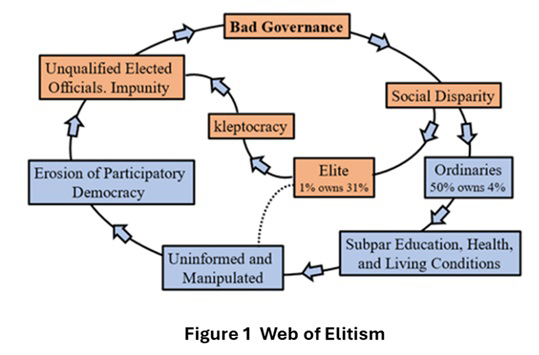 Based on most recent data (https://wid.world/country/sri-lanka/) the top one percent of the Sri Lankan population owns 31% of the nation’s wealth. That figure for the top 10% of the population is a staggering 64%. This is while the bottom 50% of the population’s wealth is a measly 4%. Once vibrant middle class has disappeared. The income disparity follows the same trend and, as a result, Sri Lanka ranks among the top countries with worst income and wealth distribution.
Based on most recent data (https://wid.world/country/sri-lanka/) the top one percent of the Sri Lankan population owns 31% of the nation’s wealth. That figure for the top 10% of the population is a staggering 64%. This is while the bottom 50% of the population’s wealth is a measly 4%. Once vibrant middle class has disappeared. The income disparity follows the same trend and, as a result, Sri Lanka ranks among the top countries with worst income and wealth distribution.
This is a major roadblock to economic development of a country and a cause for the breakdown of social structure. We need not look far; Sri Lanka is a prime example. While there is no ideal income or wealth distribution ratio, the impact of this inequality is out there for everyone to see. The few privileged dominate the political power and economy. Their superior purchasing power determines the cost of goods and services in the market.
Not having such resources, the underprivileged, a euphemism for the ordinary people, ends up with limited access to food, shelter, clothing, education, healthcare, and many other essentials. The heart wrenching irony is that those who break their back to keep the economy going – farmers, estate, and domestic workers, for example – end up at the bottom of that scale. Sadly, it is those destitute who lack access to information that become easy pray to schemers with dubious political agendas. We must reject attaching labels with potentially negative connotations to movements aimed at correcting such injustices or inequalities.
Unfortunately, our cultural and religious outlook stand in the way of realising the cause and effect of this vicious cycle. The truth is that there is nothing wrong with being rich. No one denies that, and in a just society, everyone has the right to aspire to be rich and powerful as well. Therein lies the multibillion question: Did our rich and powerful earn these rights in a just and equitable manner? Our cultural and religious thinking has compelled us to think that the rich got rich because they have accumulated good karma in previous lives.
The not so fortunate suffer due to their bad karma, and there is nothing they can do about it except for accumulating good karma and hope for better things in the next life. What a load of hog wash? We do not and should not oppose or envy the accumulation of wealth by ethical and legal means. That is necessary for the economic development of the country. The problem arises when most people do not have access to three square meals let alone access to the economy while the elite enjoy all manner of luxuries at the expense of the poor. Supermarket shelves may be laden with luxury goods, but if the ordinary citizen cannot afford them, that has nothing to do with karma. That is the result of bad governance. It is that injustice that we abhor, not someone’s wealth.
Instead, we should be asking if any of the following activities are involved in the rich and powerful gaining such privileges: bribery, extortion, cronyism, nepotism, parochialism, patronage, influence, graft, and embezzlement. If they did, there are three words to describe their actions: Corruption, Corruption, and Corruption. No explanations necessary, Sri Lanka’s elite is synonymous with corrupt, except for a handful of true entrepreneurs. No matter how good the policies are, without the eradication of corruption, there is no way to restore the economy or the social order. In Sri Lankan context, elite, corruption, bad governance, and the collapse of economy and social structure are the same. How they are interdependent and intertwined is illustrated in Figure 1. That is the reason that eradication of corruption has become the battle cry. But how well has the population understood that message? The answer lies in the electoral map that emerged on the 22nd. Not very well, is the answer, and that must be changed before taking the next step.
Fortunately, just enough people understood the facts. That is a small step in the right direction; however, note that 7.8 million thought otherwise. What is important is that without more people getting this message, or understanding the true cause of all our problems, there is no way to take the second step. As history attests, we could very well end up taking back that small step. That is why it must be the responsibility of all sensible citizens of the country to explain it clearly to their fellow citizens. But have no illusions, look at the figure again, the same evil forces will stand in their way.
At the last election, 3.5 million eligible voters stayed home; it is true that some of them have left the country. It is not that those who skipped voting are immune from the misery the country is going through, but they have lost faith in the political system. That erosion of participatory democracy is the goal of the elite, see the figure, and they have accomplished it.
Those who skipped voting must be convinced that exercising their hard-won democratic right is not only a civic duty, but that is also the only way to salvage the country. Statistics are not available yet, but if the women were compelled to think that they have no part in politics and stayed home, they must be made aware that economic or social development cannot be accomplished without the participation of half the population. Furthermore, they have a right to participate in the economy and benefit from it.
This is especially so when they and their young children are the worst affected by the crisis. Therefore, staying away is not the solution.
The other alarming fact emerging from that map is the geographic distribution of the populations that lacks this understanding. It is unfortunate, and scary at the same time, but that tells us that there are other organized forces in operation that either hide or downplay the evils of corruption and promote other agenda. These forces arise from sources that use racial, religious, caste, or ideological divisions for their own agenda. It must be made clear to those who fall for such tactics that the effect of corruption and bad governance transcend all other human-caused divisions. The limited access to food, shelter, clothing, education, healthcare, and other essentials effect people of all religions, races, casts, trades, and political affiliations. The only exception is the elite.
We must accept the fact that there is a group of people that simply do not want to hear the truth. Their worldview is limited to their own experience. They neither see it, nor admit it that change is a universal reality. Those are the ones resistant to change, unadaptable, obstinate, or inflexible; Hanamiti karaya, traditionally called, or dinosaurs in modern parlance. Recall those who predicted that doomsday would arrive following the election? That shows that there are academic elites as well, let us not forget how the fertilizer saga and the covid treatment unfolded. They must be left alone; in a changing, increasingly educated society, they will become irrelevant. Nobody wants to revive the feudal system or re-establish the Kandyan Nayak dynasty.
The subject of corruption has been discussed and dissected to death in all forums ranging from academic journals to all formats of media, to political rallies. Yet, the message has not reached a large segment of the population in a way they can relate to. Explaining it in terms accessible to all is everyone’s responsibility, and that may be the way to bridge that red and yellow divide of the map. In that respect, at the risk of being condemned to eternal damnation, I lay some of the blame on our religious leaders for not enlightening their followers.
All religions are based on morals and ethics; is there any religion that does not condemn bribery, extortion, cronyism, nepotism, parochialism, patronage, influence, graft, and embezzlement? If so, shouldn’t all religions condemn corruption instead of bestowing blessings on corrupt and unethical elite for personal gains? Shouldn’t the religious leaders teach us the significance of putting our lives in order, here and now, and that the path to liberation is not a bartering system?
The US president John F Kennedy’s words should resonate at this moment: “Ask not what your country can do for you – ask what you can do for your country.” Let us not forget that we have not done our part for the country; with our subservient psyche, we condoned corruption until we became destitute. We waited until we could not feed our children. Some of our most important responsibilities are to elect capable leaders who are qualified to do the job, give them enough room to maneuver, and hold them accountable.
If we are committed to elect our leaders based on their merits, as we demonstrated on the 21st, that sends a strong warning to all political parties: if you wish to win, assure that your nominees are qualified and are not tainted by corruption. Do not try to hide criminal and corrupt individuals behind the party list. There should be democracy and meritocracy within the political parties, they should not continue to be subservient to elitism.
We took the first step in the right direction, but it will take many such steps before we reach our goal, a prosperous and happy nation. Our country had been a kleptocracy, a society ruled by people who use their power to steal their country’s resources. And that is the source of all our problems. The challenge the nation faces is that the same people use all manner of trickery to deceive us and hide the truth. They are good at it; the election results demonstrate that two thirds of the voters did not understand the root cause of the problem. This essay may be an exercise in analyzing the root cause, but that does not serve the purpose unless the message is understood at the grassroot level, throughout the country. For the democracy to function, the voters must be well informed.
To put it bluntly, the message they need to hear is “do not let the corrupt politicians, old or new, left or right leaning, from the North or South, come back to power.” Let us look at it this way: how can the corrupt eradicate corruption? Or why should they? For example, during the last two years, when the nation was on starvation rations, the siphoning of nations wealth away from its coffers continued. Through endless political deals, they covered up their corrupt acts and protected criminals. Are those responsible actors, saviours or traitors? Is that the way to recovery? Do we want corrupt leaders to continue to exploit us? The ill effects of corruption cross party lines, race, religion, caste, and all other divisions.
We are all victims, except the elite. If corruption is eradicated, that will open the way for sensible economic policies to work. That in turn will allow us to solve other social problems; in fact, most problems will go away. It does not happen the other way around. We must end our servitude to the corrupt elite if we must escape from this vicious cycle. The mantra that will save us from the evil is “Do not elect or reelect corrupt politicians.” We should make it a practice to recite it a few times a day.
Opinion
Pioneering new era in tourism through ancient wisdom and AI-powered technology in SL
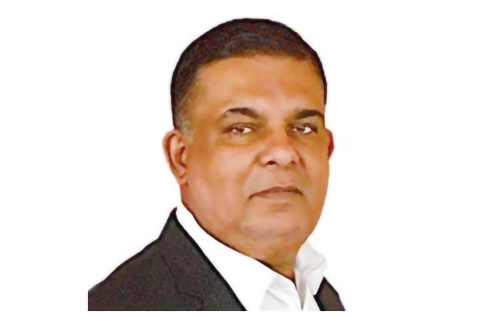
By Dammike Kobbekaduwe,
FIPM (SL), CIPM.SL, MBA (HRM)
The integration of deep learning into tourism development, particularly through photography and videography, presents an innovative opportunity to elevate Sri Lanka’s tourism industry. By using artificial intelligence (AI) to analyse, curate, and enhance visual content, the country can better showcase its cultural richness, natural beauty, and historical significance to a global audience. However, this concept can be intertwined with deeper philosophical and spiritual notions, as reflected in ancient texts and teachings across various religions and cultures, including Buddhism, Hinduism, Islam, Christianity, and historical chronicles such as the Mahavamsa.
The Concept of Energy and God
At the core of many spiritual teachings, including Buddhism, the Mahabharata, the Quran, and the Bible, lies the concept of energy as a universal source. This energy, often unseen, represents a connection between individuals, nature, and the cosmos. In these spiritual traditions, energy governs life, death, and even the afterlife. For example, in Buddhist teachings, energy is integral to the concept of bhava, or the cycle of existence, which reflects the transformation of consciousness and energy from one life to the next. Similarly, Hinduism speaks of prana (life force) and its role in sustaining life and consciousness.
As science progresses, many parallels between these ancient teachings and modern physics become apparent. Light, for instance, can only be perceived when it is reflected and processed by the human retina. Yet the limitations of our sensory perception confine us to a three-dimensional understanding of reality, while ancient stories, like those of Ravana in Sri Lankan mythology, hint at higher dimensions (e.g., the 10th dimension) beyond ordinary human experience. Advanced meditation practices, such as those taught by the Buddha, are believed to unlock deeper levels of consciousness and energy, enabling practitioners to access subtler dimensions of reality.
Technological Parallels: Deep Learning and Energy
Deep learning, a subset of AI, operates similarly to these philosophical ideas of energy. Deep learning algorithms mimic the neural networks of the brain, capable of processing vast amounts of data to detect patterns, much like how meditation can clear cognitive “clutter” and enhance mental clarity. The transformative power of meditation, which helps practitioners transcend physical limitations, can be metaphorically linked to the transformative power of AI in tourism development.
As photography and videography are central to modern tourism, deep learning can analyse tourists’ preferences, moods, and trends to create personalized experiences. In tourism promotion, the use of AI-powered tools could create content that transcends traditional marketing. AI can optimise everything from image enhancement and video editing to the customisation of travel itineraries, offering tourists more immersive and meaningful experiences.
Cultural Significance of Energy in Tourism Development
Sri Lanka, as a country rich in both spiritual heritage and natural beauty, is ideally positioned to explore the intersection of energy (in a metaphysical sense) and modern technology. Scholars such as Prof. Raj Somadeva and Thilak Kandegama have explored the rich cultural and historical significance of ancient Sri Lankan civilisations, particularly in relation to energy and spiritual power. Their work highlights how Sri Lanka’s ancient heritage, including technologies like the vimana (flying chariots described in Hindu and Buddhist texts), resonates with modern technological developments.
The ancient concept of vimana provides a striking analogy for modern innovations in transportation and tourism, where AI and deep learning could lead to rapid advancements. In a way, the lost technologies and ancient wisdom of civilisations, such as those described in historical chronicles and research like that of Area 51 in California, may inspire new technologies that redefine the future of travel.
A New Paradigm in Tourism Marketing
A paradigm shift in tourism marketing is necessary for Sri Lanka to capitalise on these insights. Instead of relying on conventional promotional strategies, the use of deep learning-driven photography and videography offers a universal language that can connect with global audiences. Visual storytelling, enhanced by AI, can bridge the gap between cultures and transcend linguistic and cultural barriers. The profound spiritual concepts rooted in Sri Lanka’s history can be brought to life through modern videography techniques, offering tourists a glimpse into both the ancient and the modern.
By addressing concepts like Rahu Kalaya (a specific time in the Sri Lankan calendar considered inauspicious), bio-dynamic agriculture, and even the idea of astral bodies and energy transformation, Sri Lanka can position itself as a unique destination that offers both spiritual and experiential tourism. Scholars like Prof. Somadeva emphasise the importance of these ancient beliefs and practices, noting their relevance in today’s world.
Conclusion: Sri Lanka’s Tourism Future
Tourism promotion with a difference is essential for Sri Lanka to thrive in the competitive global market. The country’s unique spiritual and historical legacy, when combined with modern technologies such as AI, deep learning, and immersive media, presents an extraordinary opportunity. By embracing both ancient wisdom and cutting-edge technology, Sri Lanka can not only promote its tourism industry but also offer the world a deeper understanding of the unseen energies that connect us all. Through the universal language of photography and videography, powered by deep learning, the potential for transforming the tourism sector in Sri Lanka is immense.
With support from scholars like Prof. Raj Somadeva and cultural historians like Thilak Kandegama, and the integration of new technologies, the country is poised for a renaissance in how it presents itself to the world.
Opinion
Fate of Sri Lanka’s forests and elephants:
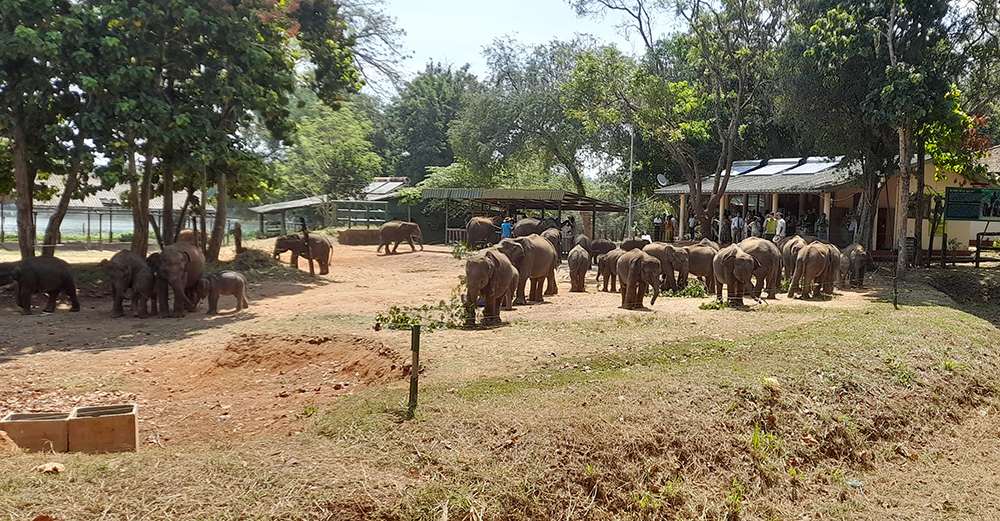
A call for urgent conservation by Prof. Sarath Kotagama
Human-Wildlife Conflict: Sri Lanka’s struggle to balance human needs with wildlife conservation is a challenge seen in many parts of the world, where rapid development and population growth encroach on natural
habitats.
By Ifham Nizam
Addressing some of the most critical environmental challenges Sri Lanka faces today, renowned conservationist and orinthologist Prof. Sarath Kotagama recently delivered a thought-provoking speech on the delicate balance between the country’s forests, elephants, and human activities.
His presentation, titled “The Fate of Nature in Sri Lanka: Forests, Trees, and Elephants in a Changing Landscape,”provided a holistic perspective that blended botanical, ecological, and legal viewpoints to emphasise the urgency for conservation efforts in Sri Lanka.
This comprehensive presentation focused on the intricate relationships that bind ecosystems together and how human interference is threatening this equilibrium, putting at risk not only wildlife but also the livelihoods of millions of people. Prof. Kotagama’s message was clear: Sri Lanka’s future is tightly interwoven with the fate of its natural habitats, and the country must act now to preserve its rich biodiversity.
Defining Forests and Trees: A Complex Task
At the commencement of his address, Prof. Kotagama, Professor Emeritus at the Department of Zoology and Environmental Sciences, University of Colombo, made an insightful observation about the complexity of defining a tree.
He pointed out that while trees are commonly perceived as simple perennial woody plants, there is no universally accepted definition of a tree in the realm of botany. Trees, according to Prof. Kotagama, should not merely be defined by their physical form. They are far more significant as they contribute profoundly to ecosystems, biodiversity, and human livelihoods.
The same complexity arises when defining forests. Prof. Kotagama highlighted that globally there are over 250 different definitions of forests, which vary depending on the interests involved, be they legal, ecological, or economic.
In Sri Lanka, forests are categorized into several types, including conservation forests, Other State Forests,and Residual Forests. Each of these categories holds unique legal and ecological importance, reflecting their varying roles in conservation, resource management, and economic use.
Historical and Institutional Framework

Prof. Kotagama
The conservation of forests in Sri Lanka is not a new phenomenon. It has deep roots that extend back to colonial times when formal efforts were initiated in 1811 to manage the country’s natural resources. The establishment of the Forest Department in 1889 was a significant milestone, as it institutionalised forest management practices that continue to influence conservation efforts today.
However, Prof. Kotagama stressed that these historical institutions should not be seen as mere relics of the past. They remain critical in managing Sri Lanka’s remaining natural resources. Institutions like the Forest Department, along with environmental legislation such as the Forest Ordinance, are still key tools in the battle to protect the country’s unique ecosystems and biodiversity. They serve as vital mechanisms for preventing further degradation of natural resources and ensuring that conservation remains a national priority.
The Ecological Importance of Forests
Prof. Kotagama underlined the multi-faceted importance of forests, particularly in the context of rural communities that depend on them for their survival. Forests play a critical role in preventing landslides, regulating rainfall patterns, and supporting river systems. They are not merely passive entities; they actively contribute to the health of ecosystems and the well-being of local populations.
In this context, the speech underscored that forests are not just vast tracts of wilderness but intricate networks that support both human life and wildlife. Prof. Kotagama’s speech served as a reminder that protecting forests is about more than safeguarding biodiversity—it is about sustaining livelihoods, cultures, and future generations.
Elephant Conservation: At a Critical Juncture
A major highlight of Prof. Kotagama’s speech was the precarious situation facing Sri Lanka’s Asian elephant, a species often caught in conflict with humans due to the rapid destruction of their habitats. Elephants, which are considered “edge species,” thrive in areas where forest boundaries meet open land. However, they are increasingly being squeezed out of these spaces as forests shrink and human settlements expand.
Prof. Kotagama shared alarming statistics about elephant populations, pointing out that in mature forests, elephant density remains low, with approximately 0.2 elephants per square kilometre. In regenerating or disturbed forests, these numbers can rise to as high as three elephants per square kilometre. However, as these habitats continue to fragment due to human activity—particularly agricultural practices like slash-and-burn—elephants are being confined to national parks. This has led to a sharp rise in human-elephant conflict (HEC), a pressing issue that threatens both the elephants and the communities living near them.
Although, Sri Lanka has made strides in managing this conflict—through measures like the construction of elephant corridors and the installation of electric fences—Prof. Kotagama expressed concern that these efforts are not sufficient. While they mitigate some of the symptoms, they do not address the underlying cause: the ongoing destruction of elephant habitats.
Technology as a Tool for Conservation
In addition to highlighting the challenges facing Sri Lanka’s elephant population, Prof. Kotagama also presented a more forward-looking approach, emphasizing the role of modern technologyin wildlife conservation.
He pointed to the growing use of satellite imagery, facial recognition software, and thermal imaging in monitoring elephant populations and their habitats. These technologies are assisting in researchers track elephant movements, identify areas of habitat degradation, and understand broader ecological trends.
However, while these technologies offer great potential, Prof. Kotagama was careful to emphasise that they must be combined with effective habitat management and proactive policies to achieve meaningful, long-term conservation goals. Technology alone will not save Sri Lanka’s biodiversity; it must be part of a more comprehensive conservation strategy that includes education, community engagement, and political commitment.
Sri Lanka’s Biodiversity: A Tipping Point

Prof. Kotagama’s message was unequivocal: Sri Lanka is at a critical juncture. The future of its forests, wildlife, and, by extension, its people, hangs in the balance. As forests continue to shrink and elephant habitats degrade, the country faces far-reaching consequences. The ecosystems that support life in the country are fragile, and the decisions made today will have long-lasting effects on biodiversity, human welfare, and economic stability.
Forests, Prof. Kotagama argued, are the backbone of Sri Lanka’s environment. They regulate water cycles, prevent soil erosion, and support both wildlife and human populations. The shrinking of these vital ecosystems would not only result in a loss of biodiversity but would also destabilise the country’s agricultural systems, water supply, and rural economies.
Conclusion: A Call to Action
Prof. Kotagama concluded his speech with a powerful call for action. He urged everyone—policymakers, conservationists, and the general public alike—to prioritise the conservation of Sri Lanka’s forests and wildlife. The country’s natural resources, he stressed, are not commodities to be exploited but intrinsic parts of its identity and future.
For Sri Lanka to secure a sustainable future, it must strike a balance between development and conservation, integrating traditional knowledge with modern technology. Prof. Kotagama’s speech serves as a reminder that the survival of Sri Lanka’s biodiversity is not just essential for wildlife but for the very fabric of the island’s human society. It is the duty of all Sri Lankans to protect the ecosystems that sustain them and ensure that future generations can continue to benefit from the natural wealth of their homeland.
Broader Themes and Global Relevance
The themes raised by Prof. Kotagama resonate far beyond Sri Lanka’s borders and touch upon several global issues, including:
Human-Wildlife Conflict: Sri Lanka’s struggle to balance human needs with wildlife conservation is a challenge seen in many parts of the world, where rapid development and population growth encroach on natural habitats.
Sustainable Development: Prof. Kotagama’s call for a development model that balances economic growth with environmental preservation is increasingly relevant in a world facing the dual crises of biodiversity loss and climate change.
Technological Innovation in Conservation: The use of modern technology in conservation efforts is a growing global trend, and Sri Lanka can be at the forefront of this movement by integrating technology with local conservation practices.
Institutional and Policy Action: The importance of strong legal frameworks and institutions in managing natural resources cannot be overstated. Prof. Kotagama’s speech underscores the need for effective governance not just in Sri Lanka but in countries around the world grappling with environmental degradation.
In essence, Prof. Kotagama’s speech was a rallying cry for a more thoughtful, holistic approach to conservation that bridges the gap between tradition and technology, human needs and wildlife preservation, development and sustainability. His message is clear: the time to act is now.
-

 Features6 days ago
Features6 days agoWAKE UP SRI LANKA ……Presidential Elections 2024
-

 Features6 days ago
Features6 days agoPresident Anura Kumara Dissanayake’s Historic Win and his Promising Start
-

 News5 days ago
News5 days agoAKD’s party has already snatched 2/3rd of 160 electorates -Zuhair
-

 Business7 days ago
Business7 days agoUber Eats promises to deliver ‘almost anything’ in Sri Lanka: launches campaign focussed on deliveries beyond food
-

 Editorial7 days ago
Editorial7 days agoWhen crooks lose grip on power
-

 News4 days ago
News4 days agoPMD reveals sheer number of vehicles used by RW’s aides
-

 News4 days ago
News4 days agoEC shoots down AKD’s enhanced subsidies in view of 14 Nov. polls
-

 Business7 days ago
Business7 days agoSri Lanka Banks’ Association congratulates new President, assures support for nation building












